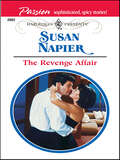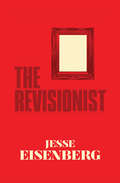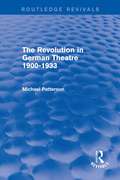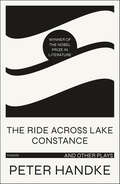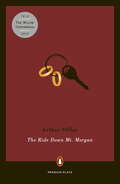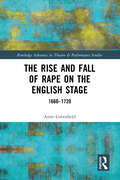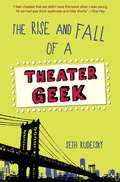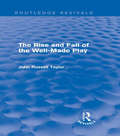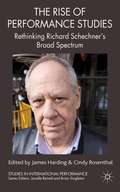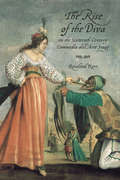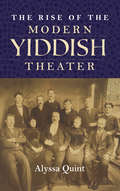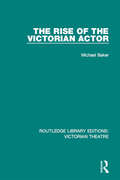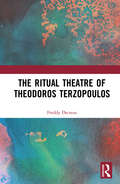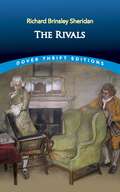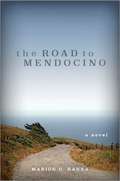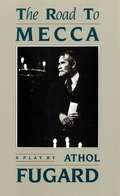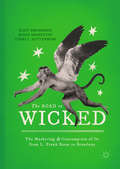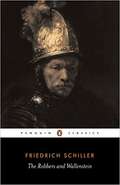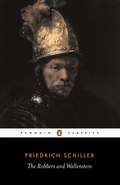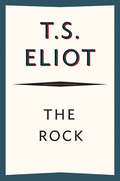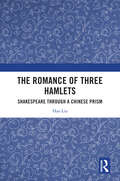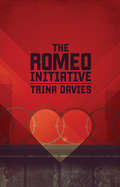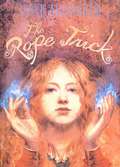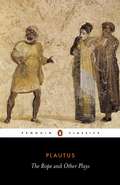- Table View
- List View
The Revenge Affair
by Susan NapierJoshua Wade was convinced that Regan was plotting to disrupt his wedding. Why else would she have agreed to organize the big day--when she clearly had a grudge against him? Regan had to admit there was unfinished business between them: a reckless one-night stand....Regan wasn't out for revenge, though she did have a hidden reason for getting close to Joshua's family. Only she could never reveal her secret plans--not even when Joshua confessed his engagement was a sham and he wanted his ring on Regan's finger!
The Reverend Billy Project: From Rehearsal Hall to Super Mall with the Church of Life After Shopping
by Bill Talen Savitri DReverend Billy, the revivalist preacher created by performance artist Bill Talen, has attracted an international following as he has railed in white suit and clerical collar against the evils of excessive consumerism and corporate irresponsibility. In his early solo performances in Times Square he delivered sermons by megaphone against Starbucks and the Disney Store; as his message and popularity spread, he's been joined by a 35-member choir (the Life After Shopping Gospel Choir) and a 7-piece band. The group's acclaimed stage show and media appearances (including a major motion picture,What Would Jesus Buy?) have reached millions. The Reverend Billy Project presents backstage accounts of recent performance actions by Reverend Billy and the troupe's director, Savitri D, recounting their exploits on three continents in vivid narratives that are engaging, shrewdly analytical, and at times side-splittingly funny. We watch as the group plans invisible theater interventions in Starbucks, designs a mermaid hunger strike to thwart gentrification plans for Coney Island, and makes an extended effort to preserve the public nature of New York's Union Square. We follow them to an action camp in Iceland and a flop of a show redeemed by a successful impromptu demonstration in a Berlin shopping mall. As thoughtful as they are funny and inventive, Reverend Billy and Savitri D's story-essays bring to life a playful yet sincere new form of political theater. "The Reverend Billy Project lucidly and perceptively explains the Reverend Billy phenomenon with wry, infectious humor and remarkable intelligence. Though many political activists have used theater and performance to achieve political ends, very few have left such articulate reports on what they did, let alone detailed road maps of the treacherous theatrical, political, and psychological territory they negotiated." ---Jonathan Kalb, Hunter College.
The Revisionist (Books That Changed the World)
by Jesse EisenbergA play by the multitalented actor: “[Eisenberg] has a wry ear and a knack for unsentimental poignancy that keeps The Revisionist emotionally compelling.”—USA TodayThough he first became known for his acting in films ranging from The Squid and the Whale to The Social Network, Jesse Eisenberg has also emerged as an acclaimed literary talent—a regular contributor to the New Yorker and a highly praised playwright.In The Revisionist, his second play, young writer David arrives in Poland with a crippling case of writer’s block and a desire to be left alone. His seventy-five-year-old second cousin, Maria, welcomes him with a fervent need to connect with her distant American relative. As their relationship develops, she will reveal details about her postwar past that test their ideas of what it means to be a family.This “tightly structured, deeply human play about the truthful mess of human experience” (Exeunt Magazine) had its world premiere at the Cherry Lane Theatre in New York in spring 2013, starring Jesse Eisenberg and Vanessa Redgrave and directed by Kip Fagan.“A rewarding account of cultural collision that yields unexpected reflections on the centrality of family in our lives—whether we idealize them or take them for granted…As a playwright, Eisenberg’s intentions seem clear. He takes a critical swipe at himself, and by extension, his entitled generation.”—Hollywood Reporter
The Revolution in German Theatre 1900-1933 (Routledge Revivals)
by Michael PattersonFirst published in 1981, this book represents the first work in English to give a comprehensive account of the revolutionary developments in German theatre from the decline of Naturalism through the Expressionist upheaval to the political theatre of Piscator and Brecht. Early productions of Kaiser’s From Morning till Midnight and Toller’s Transfiguration are presented as examples of Expressionism. A thorough analysis of Piscator’s Hoppla, Such is Life! And Brecht’s Man show the similarities and differences in political theatre. In addition, elements of stage-craft are examined — illustrated with tabulated information, an extensive chronology, and photographs and designs of productions.
The Ride Across Lake Constance: and Other Plays
by Peter HandkeA collection of six plays by Nobel Prize winner Peter Handke, spanning the early years of the Austrian playwright's careerThe first full-length play The Ride Across Lake Constance, is one of Handke's best-known works. It deals directly with one of Handke's favorite themes: the realities of theater itself, independent of the offstage world, and the way language (dialogue) and objects (props) operate in the skewed world of the stage.Therein it anticipates They Are Dying Out, the second full-length play in this volume. In some ways more conventional than many of Handke's plays, They Are Dying Out presents one of his most fascinating protagonists, Quitt, a businessman who first induces a group of colleagues to set up a monopoly and then torpedoes the scheme.The four short plays that round out the book--Prophecy, Calling for Help, Quodlibet, and My Foot My Tutor--were written before The Ride Across Lake Constance and show Handke moving from the experimental mode of his early work toward the richness and complexity that have marked him as the most important dramatist since Becket. Together, Handke's plays bear witness to the truth of Richard Gilman's observation that "in Handke's theater, language, exposed, assaulted, wrestled with, driven to limits, and pursued still further, begins to take on, like the color returning to the cheeks of a nearly hanged man, the signs of a strange and unexpected resurrection."
The Ride Down Mt. Morgan
by Arthur MillerA car wreck on the slopes of Mt. Morgan puts poet and insurance tycoon Lyman Felt in the hospital. While Lyman recovers, two women meet in the hospital to discover that they are both married to him. With his secrets exposed, Lyman tries to justify himself to the two women--the prim, cultured Theo and the restless, ambitious Leah--at the same time hoping to convince himself that he is blameless. Moving between broad farce and delicate tragedy, The Ride Down Mt. Morgan reveals the struggle between honesty with others and honesty with oneself. This new edition incorporates the revisions Miller wrote for the acclaimed 1998 Public Theatre production starring Patrick Stewart.
The Rise and Fall of Rape on the English Stage: 1660–1720 (ISSN)
by Anne GreenfieldThis book examines one of the most pervasive and successful dramatic tropes of the Restoration and early eighteenth century: sexual violence.During this sixty-year span, there were over fifty tragic and tragi-comedic productions that showcased rape and/or attempted rape—a remarkable number that was unprecedented in English dramatic history. Rape was not merely depicted more frequently during the Restoration, but it was also placed at the center of more plots, given more pathetic emphasis, and even staged more centrally. Restoration dramatists were the first to revolve routinely entire plots around the rapes of their innocent heroines, to give powerful voices to these heroines post-rape, and to imbue their sexually violent scenes with new and attention-getting staging techniques, such as discovery scenes. As this book argues, sexual violence emerged at this time as a highly flexible dramatic trope that could be used to illustrate terrifying political scenarios, elicit extreme pathos in audiences, and demonstrate the bearing that lost chastity had on social stability. It is precisely the rich, multi-faceted appeal of these productions—politically, sexually, visually, and culturally—that explains the popularity and significance of this dramatic trope on the English stage.This book will be of interest to students and scholars in Restoration, eighteenth-century studies, and theatre and performance studies.
The Rise and Fall of a Theater Geek
by Seth Rudetsky<P>Broadway, New York. The shows, the neon lights . . . the cute chorus boys! It's where Justin has always wanted to be--and now, with a winter internship for a famous actor, he finally has his chance to shine. If only he could ditch his kind, virtuous, upright, and--dare he say it?--uptight boyfriend, Spencer. <P>But once the internship begins, Justin has more to worry about than a cramped single-guy-in-the-city style. Instead of having his moment in the spotlight, he's a not-so-glorified errand boy. Plus, Spencer is hanging out with a celebra-hottie, Justin's best friend Becky isn't speaking to him, and his famous actor boss seems headed for flopdom. Justin's tap-dancing as fast as he can, but all his wit and sass might not be enough to switch his time in New York from nightmare-terrible to dream-come-true terrific. <P>Seth Rudetsky's second YA novel is endearingly human, laugh-out-loud funny, and for any kid who's ever aspired to Broadway but can only sneak in through the stage door.
The Rise and Fall of the Well-Made Play (Routledge Revivals)
by John Russell TaylorFirst published in 1967, this title considers the idea of the ‘well-made play’ in the context of how and why it has been devalued and how far, in allowing it to be devalued, we have lost sight of certain important elements of the theatre. The focus of the book is largely on the development of British theatre and those who have been instrumental to it. This is an indispensable introduction for any student with an interest in the history and development of the British theatre.
The Rise of Performance Studies
by James M. Harding Cindy RosenthalThe essays in this anthology are situated within the larger context of a critical engagement with Richard Schechner's work as a theatre practitioner, teacher, scholar, activist, and visionary. Through a wide variety of approaches, the contributors acknowledge the profound impact that Schechner's work has had on our understanding of performance as a mode of cultural practice and on the emergence of Performance Studies as a discipline. Some essays are embedded in intensely personal reflections on Schechner's work as a practitioner and teacher, while others take stock of critical concepts that are central to Schechner's work as a theorist and scholar. Yet it is not enough to say that the essays offer a critical survey of the broad spectrum of Schechner's cultural and intellectual endeavours. The essays all converge in an acknowledgement that few individuals within the theatre and performance communities have positioned their work so consistently or so consequentially as Schechner has within the key debates that have defined Performance Studies as a discipline.
The Rise of the Diva on the Sixteenth-Century Commedia dell'Arte Stage
by Rosalind KerrThe Rise of the Diva on the Sixteenth-Century Commedia dell'Arte Stage examines the emergence of the professional actress from the 1560s onwards in Italy. Tracing the historical progress of actresses from their earliest appearances as sideshow attractions to revered divas, Rosalind Kerr explores the ways in which actresses commodified their sexual and cultural appeal.Newly translated archival material, iconographic evidence, literary texts, and theatrical scripts provide a rich repertoire through which Kerr demonstrates how actresses skillfully improvised roles such as the maidservant, the prima donna, and the transvestite heroine. Following the careers of early stars such as Flaminia of Rome, Vincenza Armani, Vittoria Piissimi, and Isabella Andreini, Kerr shows how their fame arose from the combination of dazzling technical mastery and eloquent powers of persuasion. Seamlessly integrating the Italian and English scholarly literature on the subject, The Rise of the Diva is an insightful analysis of one of the modern world's first celebrity cultures.
The Rise of the Modern Yiddish Theater: Avrom Goldfaden And The Jewish Stage (Jews Of Eastern Europe Ser.)
by Alyssa QuintJewish Book Award Finalist: &“Turns the fascinating life of Avrom Goldfaden into a multi-dimensional history of the Yiddish theater&’s formative years.&” —Jeffery Veidinger, author of Jewish Public Culture in the Late Russian Empire In this book, Alyssa Quint focuses on the early years of the modern Yiddish theater, from roughly 1876 to 1883, through the works of one of its best-known and most colorful figures, Avrom Goldfaden. Goldfaden (né Goldenfaden, 1840-1908) was one of the first playwrights to stage a commercially viable Yiddish-language theater, first in Romania and then in Russia. Goldfaden&’s work was rapidly disseminated in print and his plays were performed frequently for Jewish audiences. Sholem Aleichem considered him as a forger of a new language that &“breathed the European spirit into our old jargon.&” Quint uses Goldfaden&’s theatrical works as a way to understand the social life of Jewish theater in Imperial Russia. Through a study of his libretti, she looks at the experiences of Russian Jewish actors, male and female, to explore connections between culture as artistic production and culture in the sense of broader social structures. Quint explores how Jewish actors who played Goldfaden&’s work on stage absorbed the theater into their everyday lives. Goldfaden&’s theater gives a rich view into the conduct, ideology, religion, and politics of Jews during an important moment in the history of late Imperial Russia.
The Rise of the Victorian Actor (Routledge Library Editions: Victorian Theatre #1)
by Michael BakerOriginally published in 1978. Between 1830 and 1890 the English theatre became recognisably modern. Standards of acting and presentation improved immeasurably, new playwrights emerged, theatres became more comfortable and more intimate and playgoing became a national pastime with all classes. The actor’s status rose accordingly. In 1830 he had been little better than a social outcast; by 1880 he had become a member of a skilled, relatively well-paid and respected profession which was attracting new recruits in unprecedented numbers. This is a social history of Victorian actors which seeks to show how wider social attitudes and developments affected the changing status of acting as a profession. Thus the stage’s relationship with the professional world and the other arts is dealt with and is followed by an assessment of the moral and religious background which played so decisive a part in contemporary attitudes to actors. The position of actresses in particular is given special consideration. Many non-theatrical sources are used here and there is a survey of salaries and working conditions in the theatre to show how the rising social status of the actor was matched by changes in his theatrical standing. A novel area of study is covered in tracing the changing social composition of the acting profession over the period and in exploring the case-histories of three generations of performers.
The Ritual Theatre of Theodoros Terzopoulos
by Freddy DecreusThe Ritual Theatre of Theodoros Terzopoulos outlines the story of the Athenian-based Attis Theatre and the way its founder and director, Theodoros Terzopoulos, introduced bio-energetic presences of the body on the stage, in an attempt to redefine and reappraise what it means today not only to have a body, but to fully be a body. Terzopoulos created a very specific attitude towards life and death, and it is this broad perspective on energy and consciousness that makes his work so appealing both to a general public and to students of arts, theatre and drama. Freddy Decreus’ study charts the career of Greece’s most acclaimed theatre director and provides a spiritual and philosophic answer in times where former Western meta-narratives have failed.
The Rivals: A Comedy (Dover Thrift Editions: Plays)
by Richard Brinsley SheridanImmensely popular comedy of manners featuring such memorable characters as the lovely Lydia Languish, her suitor, Capt. Jack Absolute; and Lydia's aunt -- Mrs. Malaprop, cleverly revolves around false identities, romantic entanglements, and parental disapproval. Brilliant comic masterpiece satirizing the pretentiousness and sentimentality of 18th-century society.
The Road To Mendocino
by Marion O. HannaIn THE ROAD TO MENDOCINO, M. B. Wright, a feisty Southern lawyer, agrees to help a colleague whose daughter is missing, last seen with M. B. 's nemesis, the politically powerful Judge Augustine. The search takes her to Washington, D. C. where the sudden appearance of her abusive ex-husband plunges her back into the depths of the life she had worked so hard to escape, making her quest to find Caroline that much more difficult. To deal with her misgivings, she visits Duncan's other ex-wife via the treacherous and beautiful California Highway 1. Meanwhile, Judge Augustine puts pressure on M. B. 's staff to bring her back and face the music he has waiting for her.
The Road to Mecca
by Athol FugardA South African pastor and a young teacher from Cape Town battle over the fate of an eccentric elderly widow.
The Road to Wicked: The Marketing and Consumption of Oz from L. Frank Baum to Broadway
by Susan Aronstein Kent Drummond Terri L. RittenburgThe Road to Wicked examines the long life of the Oz myth. It is both a study in cultural sustainability— the capacity of artists, narratives, art forms, and genres to remain viable over time—and an examination of the marketing machinery and consumption patterns that make such sustainability possible. Drawing on the fields of macromarketing, consumer behavior, literary and cultural studies, and theories of adaption and remediation, the authors examine key adaptations and extensions of Baum’s 1900 novel. These include the original Oz craze, the MGM film and its television afterlife, Wicked and its extensions, and Oz the Great and Powerful—Disney’s recent (and highly lucrative) venture that builds on the considerable success of Wicked. At the end of the book, the authors offer a foundational framework for a new theory of cultural sustainability and propose a set of explanatory conditions under which any artistic experience might achieve it.
The Robbers and Wallenstein
by Friedrich Schiller Introduction F. J. Lamport (TranslatorFriedrich Schiller (1759-1805) was one of the most influential of all playwrights, the author of deeply moving dramas that explored human fears, desires and ideals. Written at the age of twenty-one, The Robbers was his first play. A passionate consideration of liberty, fraternity and deep betrayal, it quickly established his fame throughout Germany and wider Europe. Wallenstein, produced nineteen years later, is regarded as Schiller's masterpiece: a deeply moving exploration of a flawed general's struggle to bring the Thirty Years War to an end against the will of his Emperor. Depicting the deep corruption caused by constant fighting between Protestants and Catholics, it is at once a meditation on the unbounded possible strength of humanity, and a tragic recognition of what can happen when men allow themselves to be weak.
The Robbers and Wallenstein
by Friedrich Schiller F. LamportFriedrich Schiller (1759-1805) was one of the most influential of all playwrights, the author of deeply moving dramas that explored human fears, desires and ideals. Written at the age of twenty-one, The Robbers was his first play. A passionate consideration of liberty, fraternity and deep betrayal, it quickly established his fame throughout Germany and wider Europe. Wallenstein, produced nineteen years later, is regarded as Schiller's masterpiece: a deeply moving exploration of a flawed general's struggle to bring the Thirty Years War to an end against the will of his Emperor. Depicting the deep corruption caused by constant fighting between Protestants and Catholics, it is at once a meditation on the unbounded possible strength of humanity, and a tragic recognition of what can happen when men allow themselves to be weak.
The Rock: A Pageant Play
by T. S. EliotThe Nobel Prize–winning author created the words for this unique play about religion in the twentieth century.The choruses in this pageant play represent a new verse experiment on Mr. Eliot’s part; and taken together make a sequence of verses about twice the length of “The Waste Land.”Mr. Eliot has written the words; the scenario and design of the play were provided by a collaborator, and the purpose was to provide a pageant of the Church of England for presentation on a particular occasion. The action turns upon the efforts and difficulties of a group of London masons in building a church. Incidentally, a number of historical scenes, illustrative of church-building, are introduced. The play, enthusiastically greeted, was first presented in England, at Sadler’s Wells; the production included much pageantry, mimetic action, and ballet, with music by Dr. Martin Shaw.Immediately after the production of this play in England, Francis Birrell wrote in The New Statesman: “The magnificent verse, the crashing Hebraic choruses which Mr. Eliot has written had best be studied in the book. The Rock is certainly one of the most interesting artistic experiments to be given in recent times.” The Times Literary Supplement also spoke with high praise: “The choruses exceed in length any of his previous poetry; and on the stage they prove the most vital part of the performance. They combine the sweep of psalmody with the exact employment of colloquial words. They are lightly written, as though whispered to the paper, yet are forcible to enunciate . . . . There is exhibited here a command of novel and musical dramatic speech which, considered alone, is an exceptional achievement.”
The Romance of Three Hamlets: Shakespeare through a Chinese Prism
by Hao LiuThrough a metaphorical journey of Shakespeare in traditional Chinese theatre, using three Chinese opera productions of Hamlet as signposts, the book discusses the relationship between Shakespeare and Chinese theatrical traditions.A brief discussion of the Yue-opera Hamlet looks back at the role of Shakespeare in the Chinese discourse of renaissance and re-evaluation of traditions since the early twentieth century. A detailed analysis of the Peking-opera Hamlet shows what is lost and what is gained in the negotiation between Shakespeare and Chinese theatrical traditions, and why. The third Hamlet is an experimental Kun-opera production, leading to a discussion of the potential for Shakespeare and Chinese theatrical traditions to join hands and reach new depths of artistic expression.The book will attract researchers, students, and enthusiasts of Shakespeare, cross-cultural Shakespearean recreation, Chinese theatrical traditions, and comparative literature.
The Romeo Initiative
by Trina DaviesSingle men are hard to come by in 1970s West Germany. So when Karin Maynard, a government secretary, meets the handsome Markus Richter, a single man who pursues her, she can hardly believe her luck. But with Markus continually away on business, thoughts of infidelity begin to consume Karin. Is her insecurity unwarranted, or is she onto something? Based on a real program in East Germany in which men were trained and sent to develop long-term relationships with West German secretaries to determine their "perfect man," The Romeo Initiative is half romantic comedy and half spy thriller with a tantalizing twist.
The Rope Trick
by Lloyd AlexanderIt's magic! The great American storyteller Lloyd Alexander conjures an engrossing tale of a bewitching magician. Lidi is not only beautiful, she has the talent to perform the greatest magic feat imaginable--the rope trick. But she must find the one master who can teach her how. On her quest to find master magician Ferramondo, she meets some traveling companions who all help on the journey: a child with true supernatural powers, a handsome outlaw with a price on his head, a successful entrepreneur who wants her in his troupe. But when the child is kidnapped, Lidi must abandon the search and summon her own powers to save the girl. The thrilling conclusion is Alexander at the top of his form in a remarkable fantasy that is both light and dark, funny and serious, believable and mystical. As always with an Alexander novel, the real magician is the storyteller himself.
The Rope and Other Plays
by PlautusBrilliantly adapting Greek New Comedy for Roman audiences, the sublime comedies of Plautus (c. 254 -184 bc ) are the earliest surviving complete works of Latin literature. The four plays collected here reveal a playwright in his prime, exploring classic themes and developing standard characters that were to influence the comedies of Shakespeare, Molière and many others. In The Ghost, a dissolute son who has squandered his father's money is thrown into disarray when he returns from abroad, a theme that is explored further in the comedy of errors A Three-Dollar Day. In The Rope - regarded by many as the best of Plautus' plays - the shipwreck of a pimp and his slaves leads to the touching reunion of a father and his daughter, while Amphitryo, Plautus's only excursion into divine mythology, offers a cheerful account of how Jupiter became father to Hercules.
